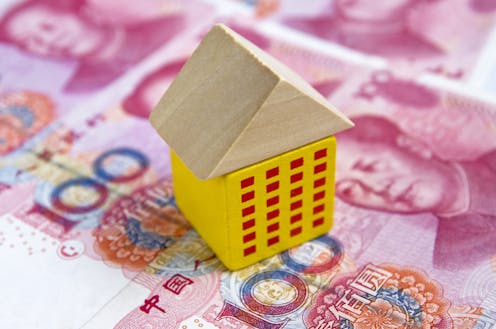why the housing market is collapsing – and the risks to the wider economy
- Written by Zhirong Ou, Senior Lecturer in Economics, Cardiff Business School, Cardiff University

China has been trimming interest rates[1] recently – in contrast to other[2] major[3] economies[4] – as it tries to stem the economic effects of its zero-COVID policy and address a growing property crisis. The country’s traditionally strong housing market has been affected by a funding crisis that has seen development paused and led to buyers refusing to pay their mortgages.
The recent spate of mortgage strikes by homebuyers across China has exposed the risk that has accumulated in the market as it has developed over the past two decades. The mortgage strikes started earlier this year among a group of people that bought homes in an Evergrande development in Jingdezhen city, Jiangxi province, but protests have since spread to buyers of other developments throughout China.
To date, more than 300[5] groups of homeowners are believed to be refusing to pay between US$150 billion (£127 billion) and US$370 billion[6] in homeloans, according to informal surveys published online.
These protesters all have one thing in common: they have been paying mortgages, often at a rate of 5%-6%, on homes they have never lived in. These properties were sold before they were built under what’s called the presale system, which is a common way[7] to buy property in China.
The trigger for the buyers’ strikes is a widespread belief among these protesters that the funds homeowners have paid in advance to the builders of these property developments have been misused.
Under the presale system, buyers deposit money in an account before the property is built. Chinese banks and local authorities are obligated to monitor developers’ use of these funds. Developers are not supposed to have access to all of the money until they have hit certain pre-agreed milestones during the building process.
But buyers have recently complained[8] that many banks –- whether or not local authorities are aware is unclear –- have been providing loans to developers before the required stage[9] of work has been reached.
Buyers have also complained that, although these funds should have been kept in designated escrow accounts that regulators can monitor, sometimes they are not, enabling developers to evade regulations[10]. Overall, these buyers believe loose regulation of funds has provided some developers with both the temptation and ability to keep investing in new projects, by borrowing more before current projects are completed.
Indeed, a commonly observed pattern[11] in China’s property development industry is for developers to purchase lands, pledge them to banks to get loans, start projects, begin the presale process with buyers and then use these funds to purchase lands for other projects.
In such situations, only a portion of a buyer’s funds might go towards the construction of their own property. As a result, a recent liquidity crisis in the sector has stalled many projects because the developers involved can’t afford to continue building.
The rise and fall of the Chinese property market
Today’s situation follows a boom in the Chinese property market[12]. The housing market had been enjoying a long rise since the early 2000s, which reached a peak in 2018 before a gradual cooling that ended in a sharp decline in sales in early 2022.
The chart below (figure 1) shows the change in China’s Real Estate Climate index, which measures aggregate business activity in land sales and real estate. New house sales have slumped substantially this year, with values dropping by 22% compared to the same time last year.







